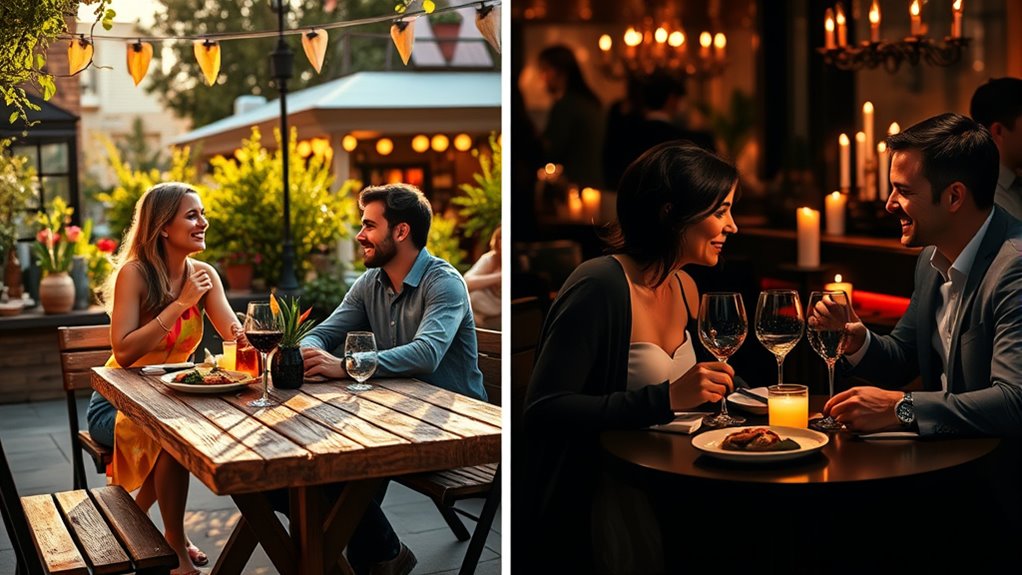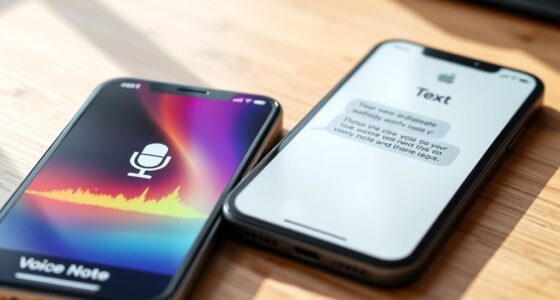Choosing between a lunch date and a dinner date depends on your goal. A lunch date creates a relaxed, casual vibe that encourages genuine conversation, making it easier to build a connection quickly. Dinner dates offer a more sophisticated atmosphere that can leave a lasting impression and foster deeper rapport. Both can lead to a second date, but understanding how atmosphere and interaction influence outcomes will help you make smarter choices—if you keep going, you’ll discover more tips to boost your success.
Key Takeaways
- Lunch dates promote relaxed, authentic conversations, making it easier to assess initial chemistry for future dates.
- Dinner dates allow for deeper, more meaningful interactions that can build stronger emotional connections.
- Shorter lunch outings are less tiring, increasing the likelihood of a second date if chemistry exists.
- Dinner dates, with their more formal setting, often leave a lasting impression, boosting second date potential.
- The choice depends on whether the goal is casual testing (lunch) or creating a memorable, refined experience (dinner).

When choosing between lunch dates and dinner dates, each offers a unique experience that can influence the tone and outcome of your outing. Lunch dates tend to create a more relaxed, casual ambiance, making it easier to connect without the pressure of an evening’s formality. You’ll likely feel more at ease, which helps both of you focus on genuine conversation rather than the formality of a full evening. Since lunchtime usually takes place during the day, there’s less concern about making a lasting impression or sticking to strict dining etiquette. Instead, the focus is on enjoying each other’s company and keeping the mood light. This casual atmosphere can lead to more authentic interactions, giving you a better sense of whether there’s real chemistry. Utilizing meal planning tools can help ensure your date is smooth and stress-free.
Lunch dates foster relaxed, authentic conversations by reducing formality and pressure.
On the other hand, dinner dates often carry a sense of occasion, with an air of sophistication and a more deliberate pace. The setting usually involves softer lighting, more refined table manners, and a focus on proper dining etiquette. While this can feel intimidating at first, it also provides an opportunity to showcase your manners and attentiveness. A dinner date can signal seriousness or intention, and many people feel that the effort involved in preparing for an evening out signals genuine interest. However, the formality might also add pressure, making it harder to relax and be yourself. If your goal is to foster a genuine connection, you’ll want to balance elegance with authenticity—showcasing good manners without letting them overshadow your personality.
From a practical standpoint, lunch dates are often shorter and more spontaneous, which can be advantageous if you’re testing the waters or have busy schedules. They’re less likely to run late or extend into the evening, reducing the risk of exhaustion or awkwardness. Conversely, dinner dates can be more immersive and memorable, giving you more time to build rapport over multiple courses or a glass of wine. They often allow for more meaningful conversations, especially when you’re seeking to establish a deeper connection.
Ultimately, whether a lunch or dinner date leads to more second dates depends on your goals and the chemistry you share. If you’re aiming for a low-pressure environment that emphasizes fun and authentic interaction, a lunch date might be your better choice. But if you want to create a sense of occasion and show your more refined side, a dinner date might be more effective. Either way, paying attention to your dining etiquette and creating a comfortable, genuine atmosphere will always work in your favor.
Frequently Asked Questions
Do Lunch Dates Tend to Be More Casual Than Dinner Dates?
You might find lunch dates tend to be more casual than dinner dates because they usually have a relaxed atmosphere. Lunches often last shorter, making them feel less formal and more spontaneous. This casual vibe can help both of you feel comfortable and open, increasing your chances of a second date. So, if you’re looking for a laid-back experience, a lunch date could be just the right choice.
How Does Time of Day Affect First Date Nerves?
You might find that midday anxiety is lower because the day’s still fresh, making you feel more relaxed and confident. In contrast, evening anticipation can heighten nerves as you worry about the impression you’re making. The time of day influences your mood and energy, affecting how comfortable you feel. So, choosing a time that minimizes midday anxiety or evening anticipation can help ease first date nerves and boost your confidence.
Are Lunch Dates Better for Introverts or Extroverts?
Think of lunch dates as a gentle breeze, perfect for introverts seeking casual conversations and social comfort. As an introvert, you’ll likely feel more at ease in a relaxed midday setting, making it easier to connect without the pressure of a formal dinner. Extroverts might find dinner more stimulating, but lunch offers a comfy space to build genuine rapport, increasing your chances of a second date.
What Are the Typical Costs Associated With Each?
When comparing costs, lunch dates generally cost less than dinner dates, making them ideal for budget considerations. You might spend less on a meal and drinks during lunch, which can help you save money while still enjoying quality time. Dinner dates often involve pricier menus and drinks, so if you’re watching your budget, choosing lunch can be a smart way to keep costs manageable without sacrificing connection.
How Do Cultural Differences Influence Lunch Versus Dinner Dating?
Cultural dining customs deeply influence whether you prefer lunch or dinner dates. In some cultures, traditional meal preferences favor dinner as a formal, social event, while others see lunch as casual and convenient. Your approach may vary based on these customs, affecting your connection with your date. Understanding these differences helps you choose the right setting, making a second date more likely by respecting their cultural expectations.
Conclusion
So, whether you choose a midday meeting or an evening outing, remember that the true magic lies in genuine connection. Sometimes, the sun’s warmth can soften even the stiffest conversations, while a cozy dinner might reveal more than words. Trust your instincts and enjoy the moment, knowing that every encounter offers a new chance to discover something special. After all, it’s not just about the time of day, but the warmth of your presence that truly matters.










